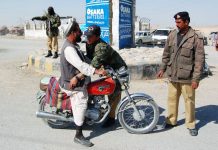
Bannu: She says she hates airplanes. When she prays, she curses them.
“The inside of my head – it is all rotten,” says Zabani Begum, 45. Where ordinary people see life playing out its course in the usual run of things, Begum sees omens. She doesn’t let her sons go out fearing someone might kill them.
“I would not go back home in Waziristan even if everyone else does,” she says, her eyes vacant, not betraying anything of her internal turmoil. “My heart is finished.”
Begum is a housewife. She belongs to North Waziristan Agency (NWA) but lives in Bannu where she and her family migrated after the Pakistan army launched a military offensive against militants in NWA on June 15, 2014.
Airplanes are a constant presence in a conversation with Zabani Begum. Drones and fighter jets. She runs for cover every time she hears a helicopter hovering around or the thunder of a jet. She shouts for children to take cover.
“I and my kids run for safety when the jets come.”
But there are no jets in Bannu, at least not fighter jets, the kind that carried out air strikes against militants in NWA.
Zabani Begum’s story is of many women in NWA – More than half a million of them that, according to psychiatrists, are suffering from the psychological effects of the war on terror playing out in the region since 9/11.
“Women in the tribal areas are restricted to their four walls and entirely dependent on men for their safety and well-being,” says Dr. Javed Akhtar, a psychologist based in Bannu. “They are trapped inside their homes and heads when it comes to conflict and constant fear. Since the tribal culture doesn’t open them to expression and sharing, it all gets bottled up, finally manifesting itself as mental illness.”
Dr Akhtar says 80 percent of his patients from the tribal areas are women. He is the only psychologist in the city neighboring NWA and first stop for the nearly a million internally displaced people from there. He has been practicing in the city for the last twenty years.
In the absence of any official data about the mentally disturbed internally displaced people, the number of patients who frequent private clinics of psychiatrists or general practitioners is the only guesstimate available on people with mental disorders.
“Not just women but the youth are also affected by the ongoing conflict in the region,” Dr. Akhtar told News Lens Pakistan.
He says the cause of rampant mental is rooted in the Russian invasion of Afghanistan when the region was first radicalized but it reached alarming proportions after active conflict in the wake of 9/11.
“The people of the tribal areas were affected by feuds, the Kalashnikov culture, unemployment and drugs to begin with,” says Dr. Akhtar. “Now there are target killings, drones attacks, jet bombings and shelling.”
Akhtar said that depression, anxiety, insomnia, sense of insecurity and paranoia are an outcome of the conflict in the area.
“When the state of depression remains for long it will have effects on the next generations,” says the doctor. “Mental illness doesn’t come abruptly. It creeps in gradually but with devastating long-term effects.”
Noor Jehan, 43, a male from the Eppi village of NWA, is one of Akhtar’s patients. He has been complaining of multiple psychological disorders since he came to Bannu city – all of his complaints relate to the ongoing militancy, military operations and displacement in the tribal areas.
Noor Jehan once ran a small restaurant and used to play football in the evenings. Now he mostly sits listless with an air of doom about him, dark bags under his eyes. When he speaks, it is only of bleak things in life.
“I am only a burden on my family,” says Noor. “I don’t think I would go home with them when they return to Waziristan.”
After much gentle prodding about what is bothering him, Noor says, “I cannot forget the moments when the jets blitzed my village. I and my son Kifayatullah were busy shopping in the village market when they came. I saw kifayat blown to pieces. He was only ten.”
“Allah gave me the fortitude to stand the shock but it left me totally ruined,” says Noor, fighting back tears. “How can I live now?”
Akhtar said thousands of youth have taken to hard drugs to overcome anxiety because drugs are easily available.
“Use of drugs among the youth, sleeping peels among the female and grownups and lack of interest in life are common trends in the tribal belt for the last one decade,” says Akhtar.
He said the government should train general practitioners to treat psychological disorders. “Training workshops can prepare doctors to deal with the mental issues of the people. If it is not taken seriously, it will have serious implications for stability of the entire tribal society.”



